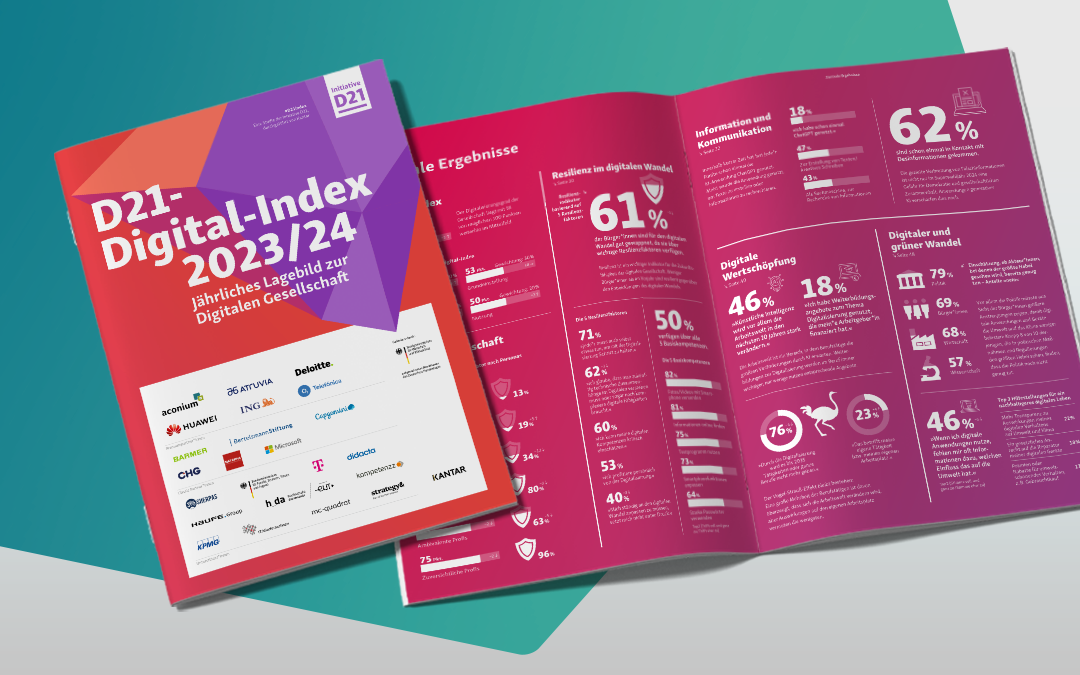- Complete D21 Digital Index 2023/2024 published by the D21 initiative
- Most citizens have arrived in the digital world: Digital Index score at 58 out of 100 points
- Artificial intelligence (AI), ChatGPT and co.: One in three people already use AI services
The D21 initiative has published the D21 Digital Index for 2023/2024. The current situation report on the digital society looks at the adaptability and future viability of the digital society in Germany. In addition to the resilience of the population in the digital transformation, the focus was on people’s information and communication behavior, digital value creation in the transformation of the world of work and the ecological change towards a sustainable digital life.
Young people in particular are resilient to digital change
Once again this year, it is clear that the majority of people in Germany are participating in the digital world and using its opportunities in a self-determined way. This is confirmed by this year’s Digital Index score of 58 out of 100 points (+1 compared to the previous year). The score is made up of four dimensions: Access to the digital world, basic attitude, competence and usage behavior. As in previous years, the “Access to the digital world” dimension is the most pronounced and has seen the strongest growth at 3 points. The age group of 20-29-year-olds achieved the highest Digital Index score of 68, which suggests that young people at the start of their careers are well equipped for the digital future. This year’s index shows that the younger people are, the more resilient they are to digital change. Overall, people’s resilience, i.e. their ability to keep pace with digital change, is decreasing, as 52% of citizens are sceptical or distanced from digitalization, according to the latest study.
However, the digital index is also rising among older generations. In Generation X (born in the mid-1960s to early 1980s) and the generation up to 1945, there was an above-average increase of 2 index points each. While Generation X is primarily catching up in the skills and usage dimensions, the overall index for the oldest generation up to 1945 is rising, particularly due to greater access and an increase in basic attitudes.
Capacity building enables more participation
In terms of society as a whole, the population in Germany is also gaining skills in dealing with digital media and applications. Every second person has all five basic skills, which the authors of the study consider to be a key building block for dealing with digital change in a resilient manner (sending photos/videos with a smartphone; finding information online; using text programs; adapting smartphone functions; using strong passwords).
Tim Brauckmüller, Managing Director of aconium GmbH: “Our digitally networked, democratic society must aspire to include all citizens. Its ideal type is characterized by the fact that it is user-friendly, inclusive, target group-oriented and securely accessible for all generations. The prerequisite for such an open, fair, digitally supported working and living environment is equal access to digital infrastructures in urban and rural areas as well as participation opportunities. The current turnaround requires us to take on more responsibility in order to promote the development of skills at all levels, from citizens to administrations to companies.”
Fit for the future with digital applications
The results of the study by Initiative D21 regarding the use of AI applications are particularly interesting. Last year, the AI innovation ChatGPT in particular dominated social discourse. The current study shows that almost one in five people used ChatGPT in the first six months after its launch. This means that many people were able to experience the potential of AI directly within a very short space of time. 47% used the application to create texts and for creative writing – but a high proportion (43%) also used ChatGPT as a search engine or to obtain information.
Background
The D21 Digital Index is a representative social study conducted by Kantar. It was first published by the D21 initiative in 2013 and since then has presented the degree of digitalization in society on an annual basis. Over time, it provides information on how digital change is progressing in German society. Based on an empirical foundation, the study forms the basis for decision-making by political, economic, civil society and scientific actors.
The D21 initiative is a network for the digital society. In addition to around 140 member companies and institutions, it also brings together stakeholders from politics, administration, business and science. aconium GmbH is a long-standing partner of the non-profit D21 association and supports the D21 Index as a sponsor.
You can download the complete D21 Digital Index 2023/2024 here:
https://initiatived21.de/publikationen/d21-digital-index

